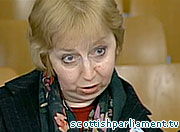MSPs should be ensuring that elderly, ill and disabled people have the best quality of life for as long as possible rather than looking to legalise assisted suicide, according to the head of a disability rights consortium.
Dr Sally Witcher, Chief Executive of Inclusion Scotland, told Holyrood’s Health and Sport Committee that disabled people are “directly affected” by a Bill allowing people with a “life-shortening” condition to ask for help to kill themselves.
Her comments came during an evidence session on the Bill, during which serious concerns were raised by pro-life campaigners and the Chairman of the British Medical Association (BMA) Scotland.
Wide scope
Dr Peter Saunders, of the Care Not Killing alliance, said he is “deeply concerned about the wide scope of the bill”, and the way it gives power to doctors.
He said that we are calling on “busy general practitioners” who do not necessarily “have the skills of palliative medicine specialists or psychiatrists, to make judgments about patients whom they might only just have met and whose family situation they do not know; to assess their mental capacity when they might not be able to do so; to assess undue influence; and to judge whether a condition falls within the broad range of conditions”.
“There are a huge number of pressures and there are some doctors—and I am talking about a minority here—who really scare me and who, if they were to have such power and authority, would abuse them.”
Judgment
And Dr Peter Bennie, Chairman of the BMA Scotland, warned that if the Bill became law, doctor-patient discussions may change so that the patient thinks the doctor might be “forming some sort of judgment that their life may be reaching a stage at which they do not want to live it”.
He said, “at heart, it is about recognising the dignity of each individual and not trying to prejudge what the person thinks about their own lived existence”.
Dr Sally Witcher, herself disabled, told MSPs that under the plans, people could feel coerced into ending their lives.
Burden
“We absorb messages about being a burden on the taxpayer. We could say that that is not coercion, but there is that pressure and culture, alongside the fear of becoming disabled.”
“Rather than say that we should make it easier for people with that profound fear to end their lives”, she added, “we need to challenge those negative attitudes and have public policy that ensures that, when people are old, ill or disabled, they get the best quality of life possible, and that the right sort of support is available to enable full and independent living as equal citizens for as long as possible”.
Writing in the Scotsman Dr Calum MacKellar, Director of Research at the Scottish Council on Human Bioethics, said that legalising assisted suicide would undermine individuals’ “inherent equality of value”.
Inherent worth
He said it would mean that “the whole of society, as well as the Scottish Parliament, would accept that some individuals can have, for the first time in history, lives which no longer have any inherent worth and meaning.
“It would give the message that the very value and significance of a human life is merely based on subjective choices and decisions and whether a life meets certain quality standards”, he explained.

